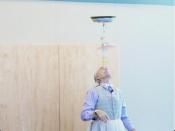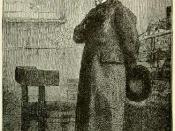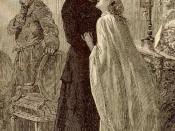LES MISERABLES In Victor Hugo's Les Miserables, the author portrayed a character who yearned for freedom yet was held back with the guilt of deducting another man's innocence. Jean Valjean needed to reconcile two conflicts. The desire to retain his freedom or to turn himself in to preclude Champmathieu from being punished in his stead. He looked "into the depths of {his} conscience without emotion, nor without trembling" (74). For Jean Valjean "there {existed} nothing more terrific then this kind of contemplation" (74). As he was torn between retaining his freedom or turning himself in, Jean Valjean acknowledged that he obtained his freedom through God's will and he "must do nothing contrary to the will of God" (77). Jean Valjean desired to retain his freedom not only for himself, but on the contrary, for the country. He believed that "the highest duty {was} to think of others" (79). The prosperity of all increased: "industry {was} quickened and excited, manufactories and workshops {were} multiplied, families, a hundred families, a thousand families, {were} happy; the country {became} populous; villages {sprung} up where there were only farms, farms {sprung} up where there was nothing; poverty {disappeared}, and with poverty {disappeared} debauchery, prostitution, theft, murder, all vices, all crimes!"(80).
He thought of all he had done to help and improve the country and concluded "how foolish and absurd {he} was when {he} spoke of denouncing {himself}" (80). Jean Valjean, invariably, thought of others before himself. He would have been pleased "to do the grand and generous" by turning himself in to preclude the innocent Champmathieu. Nevertheless, "must an entire country be let to ruin" to "save {a man} from punishment {which was} perhaps a little too severe, but in reality just" (80). That would be abominable! Jean Valjean was a little apprehensive about his decision not to turn himself in. He supposed that if "there were a misdeed for {himself}in this, and that {his} conscience should some day reproach {him}; the acceptance for the good of others of these reproaches which weigh only upon {himself}, of this misdeed which affects only his soul, why, that is devotion, that is virtue" (80). Jean Valjean "seemed that he was satisfied" for "diamonds are found only in the dark places of the earth; truths are found only in the depths of thought" (80). After descending into these depths, after having fumbled long in the blackest of this darkness, he had found one of these diamonds, one of these truths, and held it in his hand! While he listened to Javert, Jean Valjean's first thought was "to go, to run, to denounce himself, to drag this Champmathieu out of prison, and to put himself in his place" (74). He then "repressed this first generous impulse, recoiled before such heroism, and said to himself: 'Let us see! Let us see!'" (74). Jean Valjean questioned himself upon this "resolution formed" (77). He confessed to himself that "all he had been arranging in his mind was monstrous," that to "let the matter alone, not to interfere with God, was simply horrible" (77). Jean Valjean realized that "the last degree of hypocritical meanness" was to let this "mistake of destiny and of men be accomplished" by lending himself to it by his silence was a "base, cowardly, lying, abject, hideous crime!" (77). Jean Valjean continued to questioned himself. He harshly asked himself what he understood by this: "my object is attained" (77). He had no other object then to "save, not his body but his soul. To become honest and good again. To be an upright man" (78). Jean Valjean wanted to "deliver himself up, to save this man stricken by so ghastly a mistake, to reassume his name to become again from duty the convict Jean Valjean" (78). In order to really achieve his resurrection and to "close forever the hell from whence he had emerged" he must have emerged in reality by falling into it in appearance (78). "All he had done was nothing" if he did not do that! (78). He pronounced: "Well, let us take this course! Let us do our duty! Let us save this man" in a loud voice to declare and reassure himself of his decision (78). Jean Valjean felt that he had "reached the second decisive moment of his conscience" (79). The bishop marked the first phase of his new life and that this Champmathieu marked the second, "after a great crisis, a great trial" (79). Jean Valjean was torn between two conflicts: to retain his freedom of preclude Champmathieu from being punished in his stead. He could see nothing distinctly for "the vague forms of all the reasonings thrown out by his mind trembled and were disspatched one after another in smoke" (84). However this much he felt, "that by whichever resolve he might abide, necessarily, and without possibility of escape, something of himself would surely die" (84). Jean Valjean looked inot "the depths of {his} conscience" and "collected his thoughts" (74). He examined the situation and " found it an unheard of one" (75). After he contimplated "in the depths of his conscience, hanging over what might be called an abyss," Jean Valjean realized that to retain his own freedom he needed to turn himself in (77). He would not be able to live with himself in freedom and happiness without telling the truth and turning himself in. It was God's will that he "may carry on what {he} had begun, that {he} may do good, and that {he} may be one day a grand and encouraging example" (77). What kind of man and example to the country would Jean Valjean be if he did not tell the truth, turn himself in, and take full reasponsibility for his own actions? On this account, Jon Valjean turned himself in and precluded Champmathieu from being punished in his stead.





